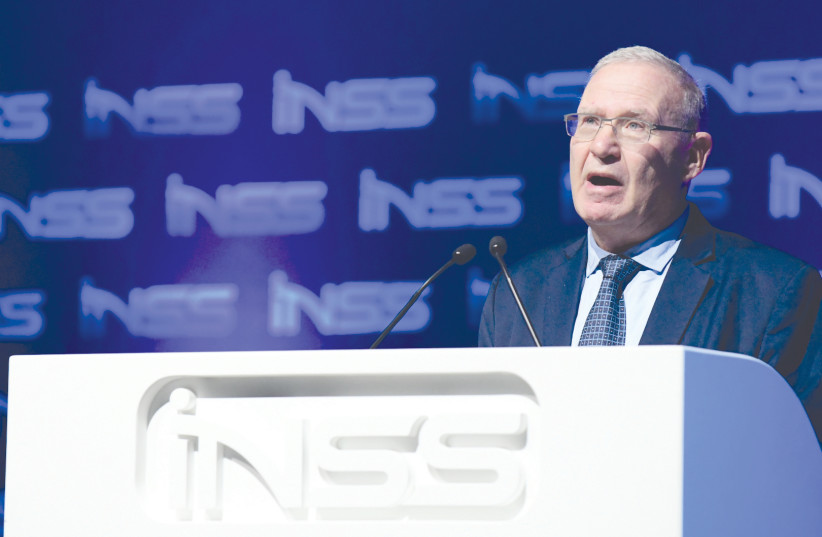A partial deal is still possible by the spring of 2021.

Top former CIA, MI6, Mossad and other key officials are doubtful that there will be a major comprehensive deal between Iran, the incoming Biden administration and the global powers in 2021.
Speaking as part of an INSS virtual conference, former Trump national security advisor John Bolton and former MI6 chief Sir John Sawers both explicitly said that if any deal could be struck, it would take more than a year.
Likewise, former top CIA official Norman Roule strongly implied that the negotiating positions of the incoming Biden administration and the Islamic Republic were far apart and any comprehensive deal would be a drawn-out endeavor.
Similarly, top Israeli Defense Ministry official Zohar Palti said that, “the Iranians are not going to compromise about anything… I do not come to 2021 with a lot of expectations.”
Bolton acknowledged that President-elect Joe Biden has said that he would like to negotiate with Iran to rejoin the nuclear deal, but said that he thought the president-elect would find “the whole region more complex” than they might expect.
The former US national security advisor also said that if the main dynamic leading into the 2015 Iran nuclear deal was US-EU cooperation, that Israeli cooperation with moderate Sunni countries had upended all expectations and past trends.
Supporting this last point, Emirates Policy Center president Dr. Ebtesam al-Ketbi also participated in the Israeli INSS-sponsored conference.
She said that the new move should be “regional dialogue for a regional agreement under US and UN auspices” instead of the model of world powers pushing aside regional concerns.
Next, she said that the EU and other global powers could not simply ignore issues like Iran’s ballistic missiles because they might be out of range whereas Gulf countries and Israel could be targeted.
Further, Ketbi said that, “Biden will link the US return to a nuclear deal to some conditions to be met by Tehran. Biden wishes to reap the benefits of the Trump [administration] pressure with a view to forcing Iran to meet some obligations outside of the [2015] nuclear deal.”
“This scenario is opposed by Tehran and its allies,” said Ketbi.
Roule said that though there likely would not be a comprehensive deal all that quickly, there could be a short-term smaller confidence building interim deal.
The former CIA and Office of the Director of National Intelligence official said that Iran would desperately want to “obtain initial financial relief – perhaps in terms of a COVID payment,” simply to stay afloat until conditions are ripe for a broader deal.
Moreover, he predicted that Iran would only fully “return to the JCPOA if the US will not be able to easily bring back the snapback” sanctions and if they could “ensure that a future Trump administration [in 2024 or later] will not be able to repeat its actions.”
Roule said that there were major differences between how the EU viewed Iran as engaging in “problematic behavior” in a sense of tolerable minor infractions, versus how Israel and moderate Sunni countries, who have been hit by Iranian rockets, viewed Tehran as a grave threat.
In addition, he said that there were other new dynamics surrounding any negotiations, including that, according to foreign reports, the US and Israel have proven that “no individual cannot be removed” by the US and Israel’s targeted killing capabilities.
His comments came following the successive killings of Iran’s Quds Force chief, its nuclear program chief and al-Qaeda’s number two who had been living in Iran.
Roule also voiced pessimism about whether there was a global alliance to confront Tehran about its ballistic missile program and its destabilization of the region.
Although the EU and some other countries might voice vague support for these goals, he said the global powers were “fragmented” and that it was unclear whether there had ever been a real widespread will to press the ayatollahs on such issues.
Former IDF intelligence chief and INSS executive director Amos Yadlin focused on the same issues, saying, “what is really important is to close the loopholes from the old JCPOA.”
Yadlin said that giving up leverage created by the Trump administration maximum pressure sanctions campaign without getting new Iranian concessions on ballistic missiles and its destabilizing the region “would be a big mistake.”
The former MI6 chief Sawers said that though he did not foresee a major breakthrough in 2021, he thought it was possible there would be a major deal in 2022.
He acknowledged that even in 2022, “a lot of things would have to fall into place for that to happen.”
Moreover, Sawers, who negotiated with Tehran from 2003-2007, stated, “Simply with maximum pressure, we will not find a path to agreements. Iranians are a proud people.”
But he still encouraged seeking a deal, arguing, “it is easier to use force, to destroy things, to kill people. It is a harder task in life to build bridges, build trust and to create an environment where people live in peace with one another.”
In contrast, Bolton criticized Trump for going too easy on the Islamic Republic, saying that sanctions should have been applied faster and more simultaneously to shock them.
Further, Bolton said that the US must be willing to use military force to aid the Iranian public in achieving regime change and to eliminate the possibility that the ayatollahs could get a read-made nuclear weapon from North Korea.
Ketbi did not sound optimistic about a complete deal before Iran’s presidential election in June 2021, but said that a partial deal might be reached in spring 2021, appearing to allude to the possibility of partial sanctions relief for partial Iranian renewed compliance with nuclear limitations.
As reported by The Jerusalem Post
